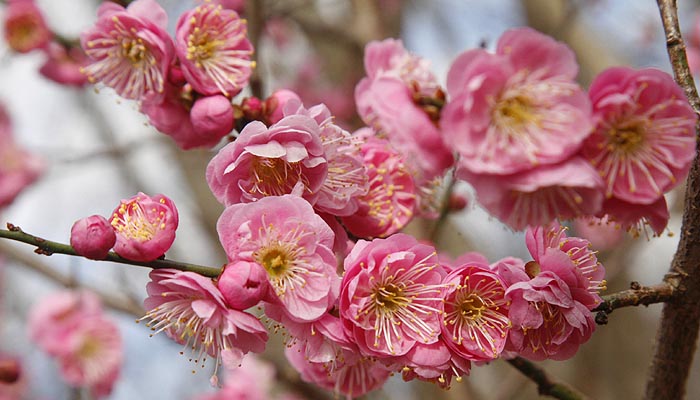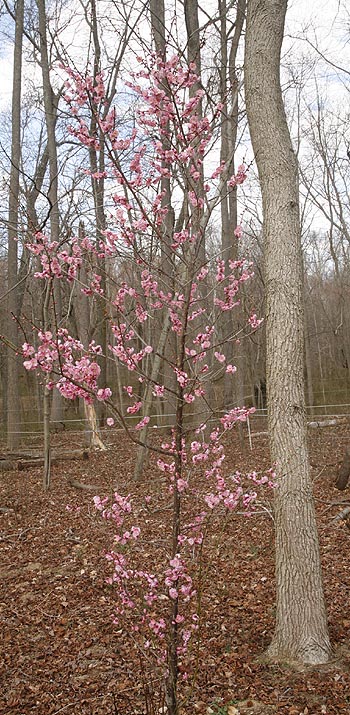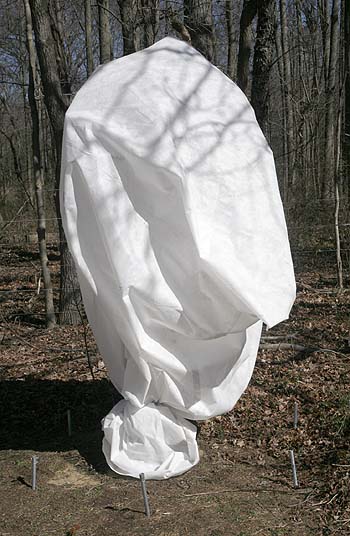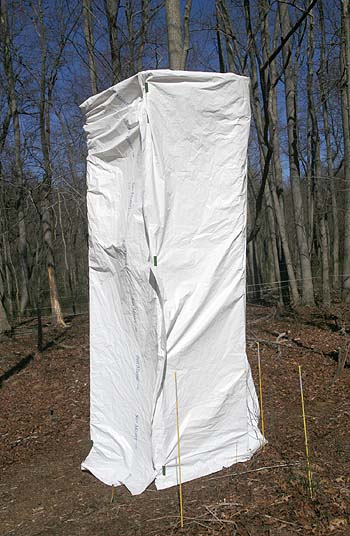How to Protect your plant from late winter cold snaps.
Unusually early plant growth is susceptible to changes in the weather.

It's been an usual winter, the temperatures have been high across quite a bit of the country. Here in the northeast its been in the high 60's low 70's for almost a week.
The plants think its spring!
|
Lots of plants are starting to come out of their winter hibernation and starting to show growth. Others are even flowering. For us our beautiful Japanese Apricots are in full bloom. If you have never seen one of these fairly rare trees you are missing out. Their blooms are wonderful. Trouble is this year they think its spring and its not. Blooming in the sunshine of 70° weather is one thing but then the temperatures are going to drop down below freezing overnight. You may have the same problem. What to do about the coming cold?Ground plants. Medium sized plants that are flowering or budding. Larger plants |
 Warm weather brought the lovely Japanese Apricot tree into bloom way to early. |
Trees and other large plants.
Well if it's a big tree there is nothing you can do. Our maple trees
are flowering but they just have to take their chances there is nothing
to do for a big tree.
Smaller trees can be covered in fabric. You can buy row covering fabric
sometimes called floating row cover. Don't get the really thin stuff it
tears easily and is a waste of money. Get something a little tougher and
either wrap the tree or if you have a sewing machine turn it into a large
bag that can be dropped over the tree and tied around the trunk. That's
what we did for our apricots. It was a two man job to get the things sown
as there was so much fabric it keep trying to pull out of the sowing machine,
but with one person holding and the other sewing it was pretty easy. If
you are a sewer and intend to do this, use clothes pegs to hold the fabric
together not sewing pins, it's a lot easier to work with.
 Japanese Apricot tree covered in bag made of plant protection fabric |
Floating row fabric is fairly inexpensive but you need to buy it in advance so you are ready to use it. Greenhouse megastore has a nice selection. You may need to buy more than you need as it comes in fixed lengths but its fairly inexpensive. Once you have some its easy to get out and use every year and you will be happy you did, its got all kinds of uses to keep the plants warmer in cold snaps or extend the season a little in the fall. Its always good to have some on hand. We buy it by the roll so we have enough to do any job on the farm in a hurry. If you don't have any row cover any kind of fairly lightweight fabric will do. Old sheets, curtains and such like can be put to use. Its never a good idea to throw out old sheets they can be easily pressed into service as plant covers. We used to do this all the time before we bought real row cover. If you have nothing on hand see if there is an inexpensive fabric store near you. Some Wal-Mart's still have cheap fabric available. So it might have transformers or ninja turtles on it the plants don't care. Keep the fabric around it will last for years and keep your plants warm and cozy during cold snaps. Fabric needs to be tightly woven if you can see through it or it has an open weave then it wont do the job. If possible pick a lighter color but any color will do. If you buy a bolt of it you can just wrap it around the tree to cover it all up. I used fabric and old sheets for years before we bought row cover its more expensive to buy fabric but if you need it in a hurry it's the best option. Now I have too much that needs protection to use fabric and buy row cover by the roll. |
| If it gets REALLY cold.
|
 Japanese Apricot tree now wrapped in white plastic to protect it from the late snowfalls and frigid temperatures. |
If you are in a hurry.
Head to home depot and pick up some of their thin white plastic drop
cloths. These are ideal for short term plastic fabric. Ideally you need
something a little thicker but they will work well for a while. The major
problem is that they are very thin so if the wind blows you could get
holes poked in them by plant twigs and branches.
If you are covering bushes or small trees make sure that you either take
the coverings off when the sun comes out and the temperatures rise or
at least open the bags up so that the air can get in and the plant does
not get too hot. While white plastic will keep plants a lot cooler than
transparent it can still get hot under there when the full sun is hitting
it. Remove the covering when temperatures rise to a reasonable night time
level, but be ready to put them back on again if the temperatures fall
again.
With a little care plants can be coddled through this strange weather
and come out in spring with no harm done.
If you want more information on how to protect your plants from frost. Check out this fairly comprehensive article from Happy DIY Home.
| Janice Hazeldine PhD is the owner and head grower of Floral Encounters an organic Medicinal Herb farm that is also a designated sanctuary for pollinators. |





